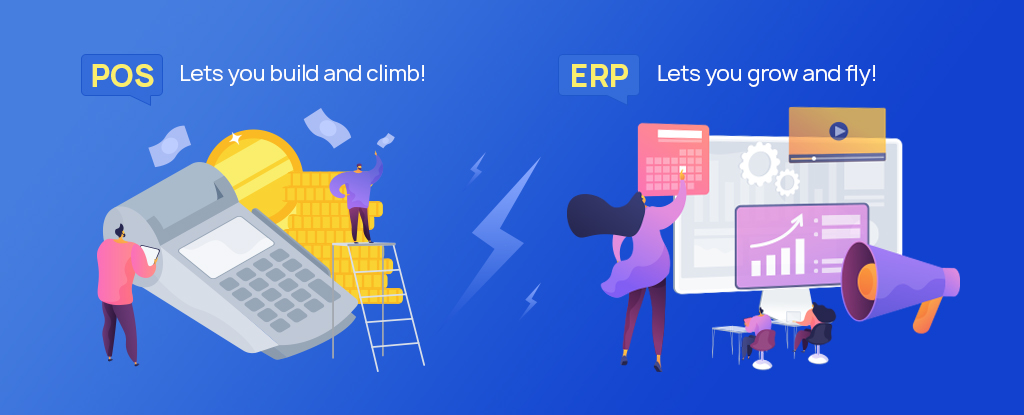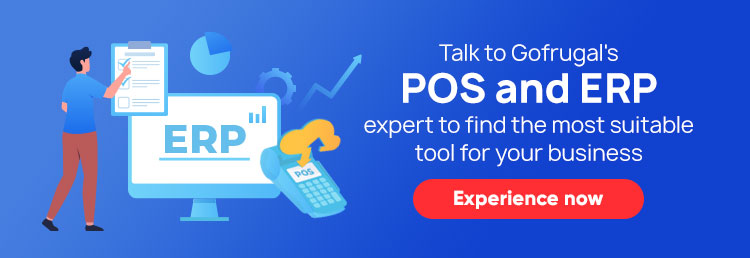In business, there is a lot of jargon used to discuss operations or to refer to specific practices. There are also a number of different systems used internally to keep things running smoothly. With so much jargon and so many program names, sometimes, even the most seasoned business owners never really know the actual definition of a term or the differences between similar tools. One common point of confusion is the difference between ERP and POS software. This article looks to clear up that confusion so you can feel confident discerning an ERP system from a POS.
Contents
- What is POS?
- What is ERP?
- ERP Vs. POS: How does an ERP differ from a POS?
- POS Vs. ERP: Which should I choose?
- ERP & POS integrations
What is POS?
Point-of-sale (POS) is a term used to refer to the location at which a customer makes a payment. POS software, however, is not just a cash register. It has come a long way, encompassing more than just a cash register, becoming more of a business booster.
POS software is not just the digital version of a cash register. It has turned out to be a one-stop solution that addresses all the diverse business needs and helps automate the checkout process, simplify operations, and service customers well. POS helps streamline operations including purchasing, inventory management, sales, customer management, and accounts by integrating with hardware devices like payment terminals, weighing scales, barcode scanners, and printers.
What is ERP?
ERP stands for enterprise resource planning. ERP is a software widely used by organizations to manage day-to-day business activities, including accounting, human resources, procurement, project management, risk management, compliance management, supply chain operations, ordering, delivery, and reporting.
A robust ERP system integrates all the core functions into a unified system that helps plan, budget, predict, and report on an organization’s results. Businesses need an ERP system that can bind the various functions into a single software to help them connect and collaborate with their employees, manage their everyday functions, and make data-driven decisions with the help of technology. Using an ERP system also helps improve the overall efficiency, productivity, and accuracy of every critical business process.
Many ERP systems are often customizable based on a business’s requirements and provide optional industry-specific components, like point-of-sale functionality and ecommerce tools. Implementing an ERP software’s purpose is to replace all existing software packages and manage company data from a single database.
ERP Vs. POS: How does an ERP differ from a POS?
Identifying resource needs is generally considered a task for those managing businesses. In retail, restaurant, and distribution, accounts, inventory, processes, and employees are the important manageable resources along with data, in general, which can't be ignored. The major difference between an ERP Vs. POS is in the way the respective systems handle these resources.
A POS system helps you with transactions related to all these resources. For example, you can see your employee’s performance, check inventory from anywhere, manage data, and create your sales return criteria. But all these are simple transaction-oriented mechanisms; it’s the computerization of data that can't be ignored. You might be making notes and registering receipts in ledgers and notepads. With POS software in place, you have all your data in your system and can access everything as needed.
As for an ERP, it not only helps you with resource management; it also helps you strategize and grow. It is not simply about computerization but digitization. With an ERP POS system, you don’t just feed data into your business; you let data drive decisions for you.
For example, in inventory management, you can automate your purchasing based on sales and previous sales history. At the same time, you can choose a delivery person for a specific delivery based on their location and availability. With an ERP, the system drives your business and builds productivity effortlessly.
POS Vs. ERP: Which should I choose?
There's no simple answer here; the decision is based on your needs. If you want to start computerizing your data and transactions, then a POS system will serve your purpose. On the other hand, if you’re looking for software to help you grow your business and drive your decisions, an ERP is the right fit for you.

ERP & POS integrations
An ERP integrated POS system offers immediate access to real-time information, including customer information and purchase history, which helps employees make better recommendations. This improves cross-selling and upselling. With an ERP and POS system, you can enjoy a lot of benefits.
- Manage omnichannel sales easily. You are empowered to fulfill demand from various touchpoints, avoiding delays, reducing returns, and increasing sales, all at the same time.
- Identify ledger balances and determine the cash flow for your business easily.
- Ensure data entered into both systems is accurate, decreasing data mismatch chances. The integration ensures real-time uploads and downloads of data, giving you information from a single point.
- Enjoy a holistic view of your business that helps you determine sales, inventory, and revenues. This, in a way, helps you accurately plan and maintain adequate stock levels, reducing the chances of overstock and understock situations.
Before you decide to integrate your ERP with another ERP or POS, make sure the ERP or POS service provider fulfills certain criteria:
- Seamless integration with SAP, Microsoft Dynamics, Oracle, Orion, and other ERPs
- Universal ERP adaptor that allows for a quick, quality integration without writing code, supporting all methodologies from flat file to restful services
- Freedom to innovate by building your own IP so you can bring your ideas to production faster with a developer platform'
- Open APIs to retain a third-party integration eco-system for loyalty, payment, POS peripherals, and more
If you’re looking for a POS, ERP, or a seamless integration of your ERP with a POS, Gofrugal has it all. Our team can help you navigate the sometimes confusing landscape and help you get everything you need to run your business smoothly.

